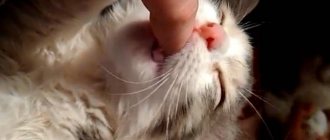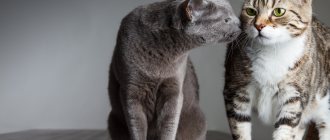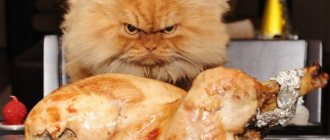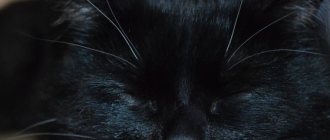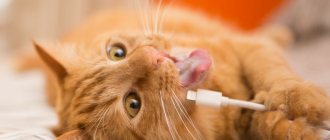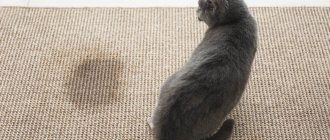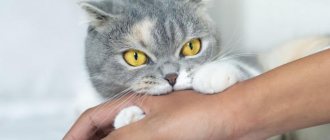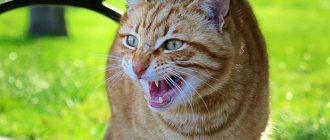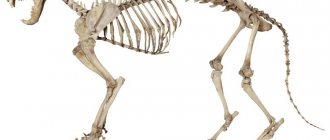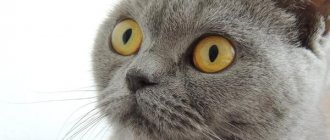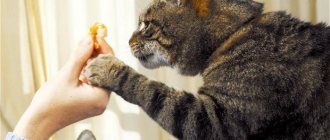The sucking reflex is an innate skill of young mammals that ensures their normal functioning during infancy. As they grow older and switch to adult foods, this reflex usually weakens. However, some teenage kittens do not want to get out of childhood and continue to suckle the mother cat or persistently stick to the owner’s fingers, areas of his clothing or foreign objects. What is the reason for such atypical behavior in children? And can it be corrected?
Why do kittens stick to objects?
Neighbor cat fluffy blanket
In the first days of life, kittens find nipples by the smell and body temperature of the cat. After about 10-15 days (depending on the breed), their eyes open. The sucking reflex will be established during this period of life. Therefore, when sucking, they will be guided mainly by smell, tactile sensations, warmth, and not by sight or hearing.
The cat, as a rule, independently decides on the issue of stopping the “babies”’ access to milk. Therefore, it often happens that the milk has already run out, but the kittens still continue to suckle. A good cat is unaware of the possible consequences. Kittens teething can damage the skin of her nipples. Which is fraught with the entry of bacteria and infections into the wound. Some cats do not prevent sucking. This leads to the fact that babies’ sucking reflex is delayed for a long time.
It often happens that a relatively adult kitten is taken by new owners. He begins to see “mother” in other objects. It purrs, moves its paws and clings, for example, to a blanket, to a rug, to clothes, to a person’s body. The main reasons for this behavior:
- Early weaning of a kitten from its mother cat
- Lack of care and warmth from the owner
- Breed predisposition and genetics
- Congenital pathologies, developmental problems
- Ordinary boredom
- Hunger (if the pet is bottle-fed)
- Stress
- Poor diet
Facts about the sucking reflex
Sucking is an indicator of the newborn's vitality and health, a method of nutrition, as well as the first experience of communication and knowledge of the world. According to zoologists:
- An active kitten, barely born, instinctively crawls to the warm mother's belly, independently finds the nipple and greedily sucks in the precious colostrum. Small and weakened babies suck poorly or are not able to suck at all, which indicates their low vitality and possible developmental defects.
- Sucking is not only the process of absorbing food, but also the establishment of a strong emotional connection with the mother, and the creation of the first psychological associations. While sucking, the kitten is in a state of peace and comfort and, having had enough, calmly falls asleep.
- The warmth of the native nest, licking by the mother's wet tongue, the smell of milk and its taste are included in the complex of first sensations of a baby kitten that has just begun its life's journey. The mother cat and littermates are the first creatures with which the baby interacts and communicates.
- Sucking contributes to the development of the kitten’s vestibular apparatus and coordination of movements: just observe what exotic positions the babies take in order to get to the life-giving source on the mother’s stomach. Subsequently, sucking skills are transformed into the ability to capture and hold prey in the mouth, as well as cut it up.
- Having opened its eyes and learned to walk, the kitten begins to more actively explore the world around it and does this with the help of its mouth and limbs. Having gently touched the paw pad and made sure that the object is safe, the baby will most likely want to taste it, trying to suck and chew at the same time.
How to properly wean a kitten from cat sucking?
Kittens feed on mother cat's milk
When kittens are 9-12 weeks old, mother cat's lactation period usually comes to an end. During this period, it is important to accustom them to adult food. Most cats try not to nurse on their own. To do this, they lie on their stomachs, move their babies away from them, or try to lie down where the babies cannot reach her.
If this does not happen, then you can put a special blanket on the cat. Which will prevent babies from accessing her breasts.
Instead, as they grow older, babies are periodically separated from the cat. For example, they take you out of the room for a while and close the door. At this time, they are given bowls with cat milk replacer. Gently poke the pets with their nose. So that when they lick the milk from their faces, they feel its taste. And they showed interest in the contents of the bowls when they got hungry. Cat milk replacer should be at room temperature or warmer. Gradually increase the time the “children” are alone. Don't leave them alone, it's stressful for them. Talk affectionately, take them off, sometimes stroke them, give them toys, pick them up. So that they get used to the person and do not feel loneliness.
Kittens are introduced to solid food gradually. There are special mixtures and liquid foods for newborns and small kittens. Up to two months you need to feed four times a day. Regardless of their consumption of mother's milk. After 6 months, the child is gradually transferred to solid food and the frequency of meals is reduced. In addition to special food, you can give boiled chicken and minced veal (depending on the breed). After about a year, cats are completely transferred to an adult diet.
It is possible to completely separate babies from their mother (in order to transfer them to another family) only after 2 months. Earlier weaning encourages the kitten to suck on objects and human clothing.
He will look for his mother.
Manifestation of the sucking reflex in older kittens
A mother cat usually feeds her offspring for up to 2-2.5 months.
Gradually, the amount of milk decreases, and, sensing this, the mother cat begins to wean her babies off the breast, running away, hiding and even growling at them. Accordingly, growing babies switch to eating adult food and soon completely forget about infant habits. However, you can also observe a picture of atypical behavior when a teenage kitten:
- continues to suck on the mother's empty nipples;
- persistently sucks the owner's fingers, earlobe, hair or fold of skin;
- spends a long time chewing, chewing and sucking on a plush toy or a corner of a fleecy woolen blanket;
- licks, chews, smacks and even swallows other inedible objects, for example, genuine leather products, drywall, scraps of wallpaper, cement chips, glued paper books.
Also watch the video on how to stop a cat from sucking:
How to wean a kitten from sucking objects?
Kittens love attention, care and affection.
If a cat jumps into your bed in the morning, purrs and interrupts with its paws, then this is a sign of trust and love for the owner. If at the same time she clings to a blanket saturated with the smell of a person, it means she considers him her patron and protector. But if sucking occurs in the absence of a person (and at other times of the day), then this indicates some problems. They need to be identified and eliminated.
First, try to review your diet. Perhaps your pet is lacking some nutrients. He tries to replenish the necessary elements through sucking objects. Replace the food, let the kitten try other flavors or food from other manufacturers. Use high-quality premium food labeled “For kittens.” Or with a note about age. The food in this segment includes all the microelements, nutrients, vitamins, and additives necessary for the baby’s growth and development.
Eliminate anything it sticks to. Do not leave clothes or blankets within the kitten's reach. Try to distract the cat by playing games or holding it in your hands or petting it. Provide your kitten with toys that he can play with in your absence. So that he doesn't get bored while you're at work.
If the cat shows interest in clothing, then it can be treated with essential oils with the scent of citrus, pine or menthol . But it’s better to put all your things in a closet or drawers. Do not scatter them around the room, on the sofa or bed.
It is recommended to contact your veterinarian if none of these methods help. Perhaps the problem of sucking and chewing various objects is associated with changing teeth or problems in the endocrine system.
Zoologists claim that in some cases, sucking is a consequence of the animal’s psychological trauma received at an early age. In this case, weaning will be useless. As a rule, any sucking goes away on its own within 3 years of the pet’s life.
Correct Methods
To wean a kitten from cat sucking without psychological trauma, you need to act gradually and slowly. Believe me, your pet will help you, because she will not allow kittens with teeth to bite her nipples. Babies will be hungry, so they will be more willing to switch to complementary foods.
Sucking is not only a way to eat, but also tactile contact. Most kittens older than 3 weeks suckle their mother only because they lack communication, like the smell, etc. Simply put, kittens are childishly attached to their mother and do not want to change this. If you carefully observe adult kittens, many of them suck not the nipple, but the mother’s fur, trample it with their paws, purr - this is communication that the mother cat will not object to.
What not to do?
You cannot shout at your pet or punish it.
You cannot swear, shout at the kitten, much less hit it . For him, this is additional stress, which will in no way help eliminate the problem. Do not create stressful situations for the animal. For harmonious development, like human babies, kittens must grow up in comfort, love, affection and care. They should have their own place (bed, house), toys, their own dishes, proper diet, water, toilet. They should receive attention and care from their owner. But in moderation. Animals do not like to be held a lot against their will. If the cat has sat on your lap and wants to go for a walk, don’t interfere.
Do not lubricate the cat's chest with any bitter or sour substances . Kittens can get poisoned or get an upset stomach. Such procedures are also not safe for the cat’s health. The skin of the nipples is delicate and can harm the cat's health.
Do not try to wean babies from sucking by spraying water. This will cause them to have a phobia of water in adulthood (there will be problems with bathing). Or they will form the wrong attitude towards the owner. Which they will fear rather than love.
What not to do during the weaning process
There are things you shouldn't do to avoid harming your cat:
- It is often advised to splash water on your pet in the process of weaning off the sucking reflex. This cannot be done, because in this case you create an association in the animal with unpleasant sensations, but also provoke the appearance of fears. The cat may get scared and become very stressed. In addition, against the background of what is happening, real psychological trauma may appear that will accompany the animal throughout its life. It is even possible to have a phobia of water.
- You cannot scold the cat or make physical comments . There is a possibility that the animal will misunderstand you and will simply be afraid. And against the backdrop of stress, the desire to suck on things or objects will only increase.
- If the kitten is weaned from its mother's breast, you should not smear pepper or anything else on the nipples . This can have a detrimental effect on the female. It is better to consider other options for weaning. For example, gradually separate animals in different rooms for a while. Moreover, it is better to play with the little fidget at this time. You shouldn't leave it alone. Nothing good will come of this.
What happens if a kitten is not weaned from sucking objects?
At first glance, sucking objects is a harmless procedure. Unlike the more typical cat behavior of eating house flowers or damaging furniture with their claws. However, this phenomenon has hidden threats. Indeed, in addition to wet areas (where the kitten has attached itself), there are other consequences.
When sucking on a blanket, rug, bedspread or other product, lumps of fabric will enter the stomach. This can cause digestive tract upset, vomiting, and abnormal bowel movements. In addition, fabric dyes are often very toxic and dangerous for the animal. Getting them inside is fraught with consequences.
By sucking on the same place, a cat can damage an object . When they suck an object, they simultaneously crush it with their paws. In this case, the kitten usually releases its claws. Unsharpened claws damage the fabric. And a place that has been sucked on many times in a row may remain stained by the animal’s mouth and tongue; the tissue will become damaged by repeated exposure to saliva.
